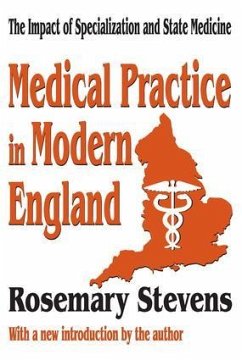Before World War II, the great majority of practicing doctors in England and Wales were general practitioners. They performed their own surgery, and were accustomed to treating a wide variety of illnesses and symptoms. Specialists were few in number, tended to practice in large towns, and were often associated with major hospitals. But rapidly changing medical institutions and services in the twentieth century have compelled specialization even among more modest doctors and hospitals. While medical specialization was not new -- for centuries physicians were differentiated from surgeons -- twentieth-century science and technology emphasized and accelerated this difference rapidly. Medical care began to shift from services rendered by the general practitioner to the employment of those doctors with a special interest -- for example, pathology, neurology, or cardiology. Author Rosemary Stevens, an expert in public health, traces, especially within the last two centuries, the patterns of English medical practice, institutions, staffing, and training, and their influence on specialization, the British National Health Service Act, and post-World War II developments. Stevens discusses the ever-relevant issues of income determination, medical education, and the future of the general practitioner in an age of specialization. Along with its companion volume, Medical Practice in Modern England is a book that will be of lasting value to scholars of medicine, medical care organization, economics, and modern social history. It is of special importance at a time of crisis in the health care systems of many European Societies.








